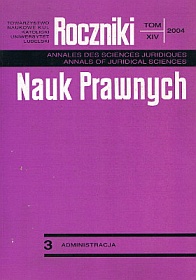The Correlation of Political Parties, Local Communities and Organs of Territorial Self-government
Abstract
The problems of the independence of territorial self-government have aroused a considerable interest among many representatives of the social sciences since the beginning of its re-activation in the Third Polish Republic. The administrative law seeks to research into the essence of its independence. Now we are witnessing a continuation of the research initiated in the beginning the 1970s by the doctrine of administrative law. It includes as follows: political influence on the process of shaping the personal compositions of the organs of administrative units, their decision-making process, and persuading local communities to political reasons.
The paper begins with a brief historical outline of the re-activation of territorial self-government and institutionalisation political parties in the Third Polish Republic. Then the tasks of councillors (of candidates) are defined with regard to local communities, and their interdependence. With regard to the most important functions of political parties, a theoretical model of political influence of political parties on local communities and organs of territorial self-government has been analysed. Through legal solutions assumed in particular bills one comes to practice.
In the context of institutionalisation of political parties the paper has analysed some selected international legal regulations and the legislation of the European Union.
Eventually, the paper draws conclusions from the changes of the legal status in Poland from the point of view of European integration. One should bear in mind that the evaluation of legal solutions as a criterion of political influence on the local communities and organs of territorial self-government occurs most often in the subjective system of evaluations.
Copyright (c) 2004 Roczniki Nauk Prawnych

This work is licensed under a Creative Commons Attribution-NonCommercial-NoDerivatives 4.0 International License.


